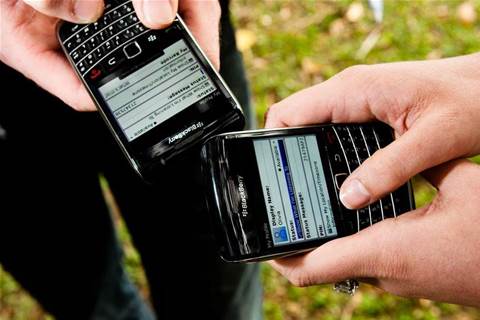The Department of Parliamentary Services will no longer use BlackBerry as its single supplier of mobile phones to parliamentarians, now offering a choice of six smartphones from four vendors.
The department started rolling out the new smartphones at the start of this month following a recommendation from the 2012 Roche report.
Parliamentarians are given a choice between a 32GB Apple iPhone 5, Samsung Galaxy S4, BlackBerry Z10, BlackBerry 9900, Nokia Lumia 920 and Nokia Asha 300.
Around 600 senators, members and certain office holders’ staff are able to access a provisioned smartphone, DPS CIO Eija Seittenranta told iTnews.
“The changes were put in place to offer more flexibility to parliamentarians to allow them to undertake their jobs more effectively,” she said.
“The changes recognise that parliamentarians are one of the most mobile workgroups and expected to be accessible at all times, whether they are at Parliament House, in the electorate offices or on the road and therefore need flexibility in how they access information and communicate.”
The selected devices provided the “right features and appropriate security and fit within our support models and systems,” Seittenranta said. The DPS tested the smartphones and found them to be compatible with its mobile device management platforms.
The department did not identify a need to modify the devices. User data is secured via a password and the device’s storage, including any memory cards, is encrypted, she said.
DPS created a pop-up shop of the six smartphones in the June sitting period to familiarise parliamentarians with the new range of available devices.
As of today, around 60 new smartphones have been deployed since the program was implemented. The Government also pays for the cost of calls and data.
The devices were procured from an unidentified telco on the Government’s Telecommunications Commodities, Carriage and Associated Services Panel. The four telcos on the panel are Optus, Teledesign, Telstra and TransACT.
Existing BlackBerry devices will continue to be used by parliamentarians and their staff until they are due for replacement, Seittenranta said. After that, parliamentarians can choose one of the six available smartphones.
Roche report
The move is an implementation of a recommendation in the August 2012 Roche report.
The report recognised demand for flexibility of device choice by parliamentarians, frustration at delays in adopting new technology and “inflexibility of the rules covering the provision of much of their ICT capability.”
It found a substantial number of parliamentarians favoured the iPhone over the provisioned BlackBerry, with users citing unnecessary restrictions, high failure rates and complex repair and return procedures for the existing BlackBerry devices.
“Some of the parliamentarians interviewed expressed the view that they were ready to accept additional risk in terms of data security as a trade-off for increased usability with simpler security procedures,” the report stated.
“A smaller number accepted the need for the existing security procedures, not only on data confidentiality grounds, but, more importantly, in terms of protecting the network itself from attack."
The report recommended more flexible choices based around budget and a wider pool of supported items such as iPhones and tablet devices.
Seittenranta’s appointment similarly came as a result of a Roche report recommendation. The DPS appointed Seittenranta as its first ever CIO after the report advised a reshuffle of how IT was delivered to parliamentarians.
Seittenranta was formerly the general manager for IT at Human Services.




.jpg&h=142&w=230&c=1&s=1)

.png&h=142&w=230&c=1&s=1)






.jpg&w=100&c=1&s=0)








_(1).jpg&q=95&h=298&w=480&c=1&s=1)


